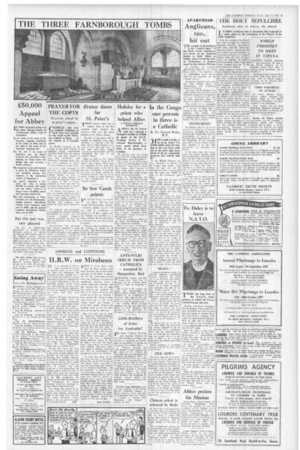Page 5, 19th July 1957
Page 5

Report an error
Noticed an error on this page?If you've noticed an error in this article please click here to report it.
Tags
Share
Related articles
Historical Mysteries
Special Welcome In A Few C Onverts Seem To Vary
World Radio
Tv Gave A Better View
LOOKING and LISTENING
H.R.W. on Mirabeau TVIt was pleasant on Sunday
night to sit down to enjoy art historical play by our friend, Mr. Hugh Ross Williamson. His romantic outlook, coupled with a keen intellectual grasp of persons and forces in history, enabled him to present Mirabeau as the disreputable charmer whose brains and understanding of men could have saved the French monarchy, but for the stupidity of the King and Queen and their court advisers.
Whether Mirabeau derived any political advantage from his defiance of all moral conventions — and he went a good deal further than we were told in the play — is bights doubtful. He would certainly have been more fully trusted by the Queen had he behaved rather better. He also would have limed longer to fight Robespierre, whose horrible legalist selfassurance made him in effect far more a " Monsieur Mai " than Mirabeau. How well that little part was written and acted.
Historical plays are not easy on television, and it was some time before one could believe in any one in this play. But Mirabeau came to dominate everything and one forgot the costume. What about Mr. Ross Williamson 's better play on Cardinal Pole ?
Having been away for some time, 1 returned on Sunday night to the seven o'clock religious programmes to find them very uninspiring. The Anglican chaplain at the Butlin Camps had very little to show or tell us. and I would have much preferred to hear the story of religion (not only Anglican) at the camps from the holiday-makers' point of view. It might have been less optimistic, but more realist. I only saw a little of the BBC programme, but enough to feel that discussions or the bringing-out of religion diversely lived are necessary to make these programmes grip.
Two things that remain in my memory when much else is forgotten. Ron Delaney making the Sign of the Cross after his race and James Robertson Justice taking a discreet pinch of snuff. Two excellent habits.
RADIO. It is less than a year
since Mr. Bruce Stewart, fresh from Australia, had his first broadcast play on the B.B.C. I remember that play particularly because there was a Bishop in it and some complicated business about a special death-bed confession and also because that was the night our radio-set got smashed! No fault of the play's, of course, that turned out to be very exciting. I have noticed Mr. Stewart's name since from time to time in the "Radio Times" and thought I would have another listen-in last Saturday when he had two short plays on during the afternoon.
They were not quite so much my "cuppa tea" though technically they were neatly constructed. The first, "It's a Tough Business" a rather sad tale of a bar-tender's ambition to he an impresario and how the first and only night of his show was ruined by the bleating of nearby sheep. This all very Australian. The second play, "Tapu Rock" took place in New Zealand and had a delightful Maori character, played by [Ma Te Wiata, who used his neighbours' large families on which to claim Family Allowance. Both
these plays, thought, conveyed very well in sound-effects the atmosphere of the two countries.
1 do hope that many of you who were not able to see Father D'Arcy S.J., on the TV version of "The Brains Trust" were able to hear the sound-track last Tuesday on the Home at lunch-time. He was wonderful in argument with that fascinating couple A. J. Ayer and Julian Huxley, and we felt he could have held his ground indefinitely even without the lighthearted backing of Lord David Cecil. But I do wish this weekly repeat of the sound-track could be timed for the evening when more people could profit from it. It is very difficult for many serious-minded listeners to follow intelligent argument without distraction at that time of day.
Joan Newton.
blog comments powered by Disqus









